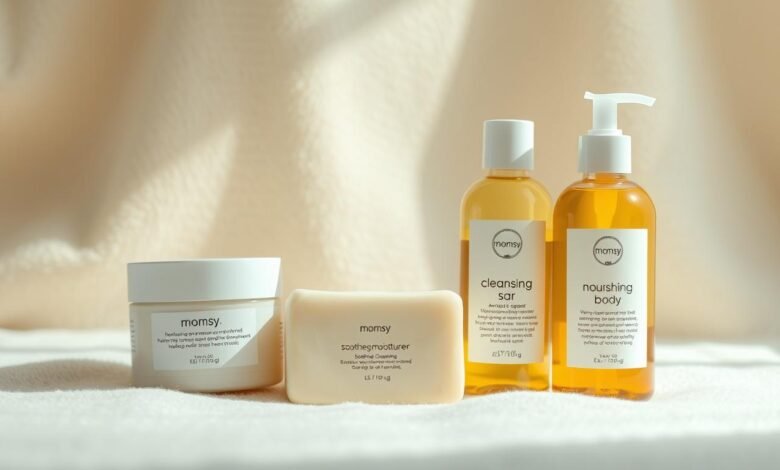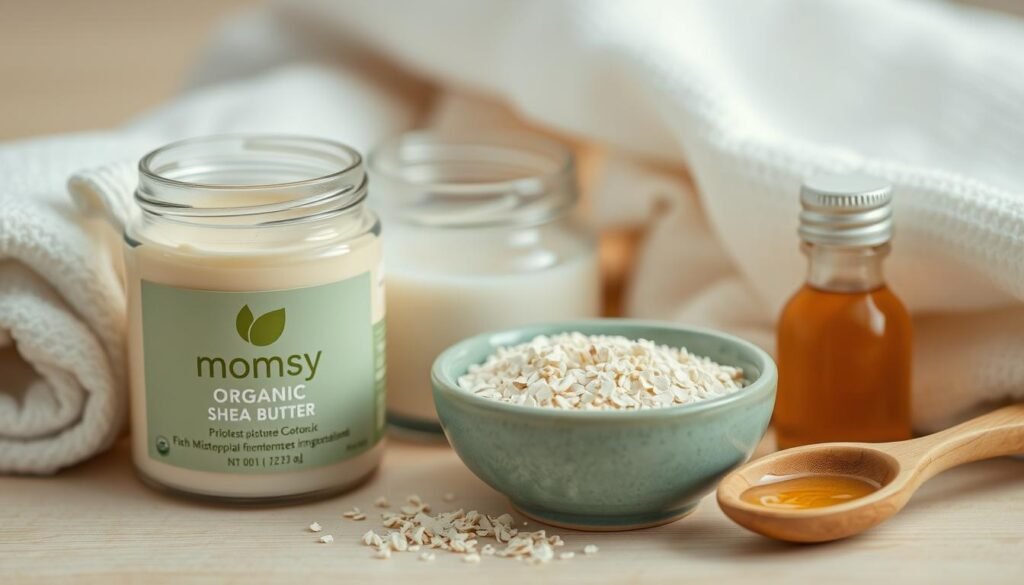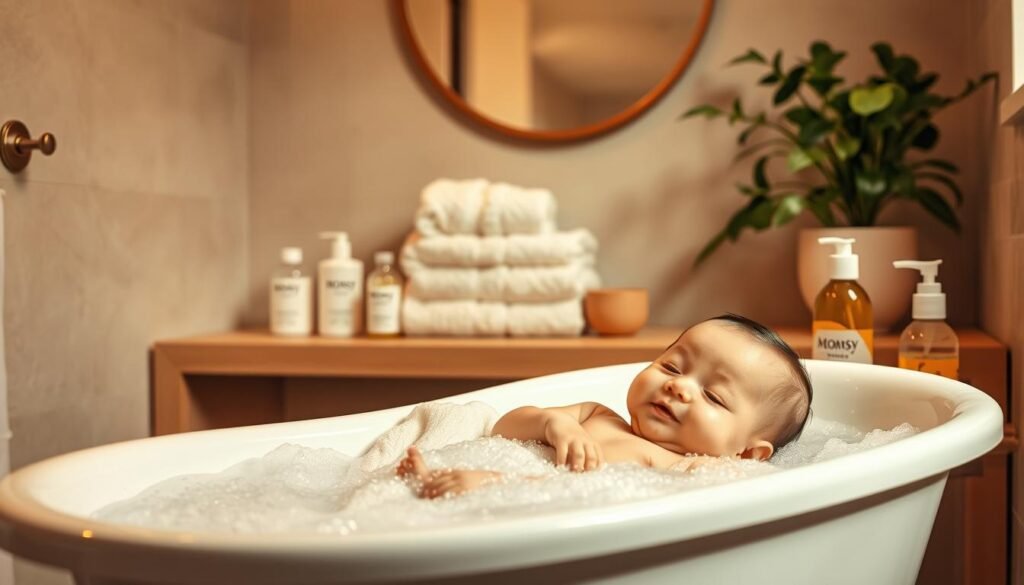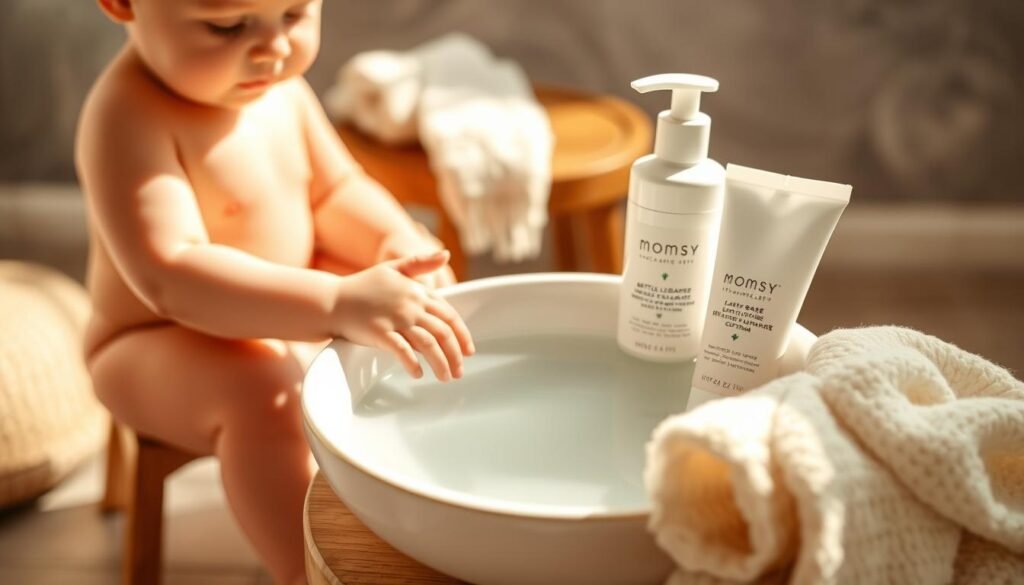Best Baby Skincare Products for Soft, Healthy Skin

Being a mother is special, and nothing is more precious than your baby’s soft skin. You want to give them the best start in life, including caring for their skin. Finding the right skincare products can be tough, but it’s key for keeping their skin soft and healthy.
Gentle care is vital for your baby’s skin. Products like CeraVe Baby Moisturizing Lotion and Mustela’s Gentle Cleansing Gel are top picks. They are gentle and safe for your little one.
When it comes to baby skincare, you need products that work well and are safe. The right products keep your baby’s skin soft, healthy, and protected. Let’s look at the best options to help you choose wisely.
Understanding Baby Skin and Its Unique Needs
Your baby’s skin is more than just a protective barrier; it’s a key indicator of their overall health. As a mother, understanding the unique aspects of your baby’s skin can help you provide the best possible care.
The Structure of Baby Skin
Baby skin is immature and more susceptible to irritation compared to adult skin. The outer layer of a baby’s skin, known as the epidermis, is thinner and less effective at retaining moisture. This makes it more prone to dryness and irritation.
Common Skin Issues in Infants
Infants often experience a range of skin issues due to their sensitive skin. Common problems include dry skin, dandruff, cradle cap, heat rash, diaper rash, baby acne, and eczema. These conditions can be distressing for both babies and their parents.
Signs Your Baby’s Skin Needs Attention
It’s essential to monitor your baby’s skin for signs that indicate the need for special care. Look out for unusual redness, persistent dryness, or rashes that don’t improve with regular skincare. If you notice any of these signs, it may be necessary to adjust your baby’s baby skincare routine or consult with a healthcare professional.
By being aware of these factors and taking proactive steps, you can help maintain your baby’s skin health and address any issues promptly.
Essential Ingredients for Baby Skincare
Choosing the right baby skincare products is key for your little one’s skin. You want to make sure they are safe and effective. This is important for your baby’s health.
Baby skincare is vital for their overall health. Ingredients like ceramides, niacinamide, and hyaluronic acid are great. They help keep the skin barrier strong, soothe, and hydrate.

Natural Oils and Their Benefits
Natural oils are great for baby skincare. They include coconut oil, olive oil, and jojoba oil. These oils moisturize, soothe dry skin, and help with eczema.
It’s important to pick cold-pressed, organic oils for your baby. This ensures they are free from harmful chemicals. You can use these oils after a bath or mix them with moisturizer or lotion.
Hypoallergenic and Fragrance-Free Products
For babies with sensitive skin, hypoallergenic and fragrance-free products are best. They are made to avoid allergic reactions and skin irritation. By avoiding fragrances and dyes, you lower the risk of skin reactions.
When looking for hypoallergenic products, check for certifications. These products are tested to be safe for sensitive skin. This makes them a good choice for your baby.
Moisturizers vs. Lotions: What’s Best?
Many parents wonder if moisturizers or lotions are better for their baby. Both have their uses. Moisturizers are thicker and better for dry skin or eczema. Lotions are lighter and good for everyday use.
Knowing your baby’s skin type helps choose between moisturizers and lotions. For dry skin, a moisturizer is best. For everyday hydration, a lotion is better.
The Importance of Baby Moisturizers
Baby skin is very delicate and needs special care. Moisturizing is a big part of this care. As a parent, you know how sensitive your baby’s skin can be. Choosing the right skincare is very important.
When to Start Using Moisturizer
You can start using moisturizer on your baby from birth. It’s important to pick a moisturizer that is gentle and fits their skin type. Look for products labeled as hypoallergenic and fragrance-free to avoid allergic reactions.
How Often Should You Moisturize?
How often to moisturize depends on your baby’s skin type and needs. Most babies need moisturizing once or twice a day, after bath time when the skin is damp. Pay attention to your baby’s skin cues and adjust as needed.
Top Recommended Moisturizers for Babies
Some of the best baby skincare products include moisturizers with natural ingredients and ceramides. For example, CeraVe Baby Moisturizing Lotion is great because it has ceramides that help repair the skin’s barrier. Other good options come from brands that focus on organic baby skincare.
When picking a moisturizer, think about your baby’s skin needs. If your baby has dry or sensitive skin, choose products that hydrate well and are gentle.
Safe Bathing Practices for Infants
Keeping your baby’s skin clean and healthy is a top priority. It starts with safe bathing practices. Bathing your infant is not just about keeping them clean. It’s also a chance to bond and help them feel relaxed and comfortable.
Best Practices for Baby Baths
When bathing your baby, remember a few key things. First, make sure the water is not too hot or cold. The ideal temperature is around 98°F to 100°F. You can check the water temperature using your elbow or the back of your hand.
Always supervise your baby during bath time, as they can slip under the water quickly. Never leave them unattended, even for a moment. Use a gentle, soft washcloth to clean your baby’s skin. Avoid using harsh scrubbers or exfoliating products that can irritate their delicate skin.

Choosing a Gentle Baby Wash
Choosing the right baby wash is key for maintaining your infant’s skin health. Opt for a hypoallergenic and fragrance-free baby wash that is designed for sensitive skin. These products are less likely to cause allergic reactions or irritation.
As
“The key to gentle skincare is simplicity and avoiding harsh chemicals,”
says Dr. Jane Smith, a pediatric dermatologist. “Parents should look for products that are backed by dermatological research and are suitable for their baby’s skin type.”
Bathing Frequency: How Often is Too Much?
Bathing your baby too frequently can strip their skin of its natural oils. This can lead to dryness and irritation. For newborns, bathing 2-3 times a week is sufficient. While older infants can be bathed more frequently, depending on their activity level and how dirty they get.
It’s important to find a balance between keeping your baby clean and not over-bathing. Over-bathing can be detrimental to their skin health. As a general rule, bathing your baby 2-3 times a week is a good starting point. You can adjust the frequency based on your baby’s needs.
Best Baby Lotion Brands for Sensitive Skin
Parents of babies with sensitive skin need to pick a gentle lotion carefully. Their skin is delicate and needs extra care, like moisturizing.
“The right lotion can make all the difference in keeping your baby’s skin soft, healthy, and irritation-free,” says a pediatric skincare expert. With many options, it’s key to find lotions that are gentle yet effective.
Must-Try Brands for Daily Use
Mustela is a standout brand for sensitive skin. Their lotions nourish and protect your baby’s skin, perfect for daily use.
CeraVe is another great choice. Their lotions are fragrance-free and hypoallergenic, ideal for sensitive skin. They keep your baby’s skin soft and smooth.
Recommended Options for Eczema-Prone Skin
Finding the right lotion for eczema-prone skin is tough. You need something that moisturizes and manages eczema symptoms. Mustela and Cetaphil offer lotions for eczema-prone skin.
These lotions provide long-lasting hydration and repair the skin’s barrier. They’re gentle enough for daily use, making them a great part of your baby’s skincare routine.
Choosing the Right Lotion for Your Baby
When picking a lotion, consider a few things. Look for hypoallergenic and fragrance-free products to avoid irritation.
Reading reviews and talking to your pediatrician is also wise, if your baby has specific skin issues. Choosing the right lotion can help keep their skin healthy and happy.
Sunscreen and Baby Health
Keeping your baby’s skin safe from the sun is key. Using sunscreen is a big part of this. You want to protect your baby’s sensitive skin from harmful UV rays. Choosing the right sunscreen is a big decision.
When to Introduce Sunscreen
The American Academy of Pediatrics says to use sunscreen on babies over six months. For younger babies, use clothes and shade instead. When your baby is ready, pick a broad-spectrum sunscreen with SPF 30 or higher.
Key Features of Baby Sunscreens
Look for sunscreens that are hypoallergenic and fragrance-free to avoid skin irritation. Mineral sunscreens, with zinc oxide or titanium dioxide, are good. They block sun rays and are less likely to cause skin problems.
Recommended Baby Sunscreen Brands
Mustela is a trusted brand for baby sunscreen. They have NEA-certified mineral sunscreen products. Think about your baby’s skin type and any sensitivities. Always test a new sunscreen on a small area first.
Adding sunscreen to your baby’s skincare routine is a big step in protecting their skin. Safe baby skincare means being careful with the products you use. It helps prevent skin problems before they start.
Addressing Diaper Rash: Tips and Products
Diaper rash is a common problem for many parents. But, with the right knowledge, you can manage and prevent it. It can make your baby very uncomfortable. Knowing what causes it is the first step to solving it.
Causes of Diaper Rash
Diaper rash comes from too much moisture, bacteria, and irritation. When your baby’s skin stays in a soiled diaper, it gets irritated and can develop a rash.
Other things that can lead to diaper rash include:
- Infrequent diaper changes
- Sensitive skin
- New foods or allergies
- Friction from diapers
Effective Treatments for Diaper Rash
To treat diaper rash, you need good hygiene and the right products. Frequent diaper changes are key to stop moisture buildup. When changing diapers, use a soft cloth and mild soap, and pat dry gently.
For serious cases, use a diaper rash cream with zinc oxide or soothing ingredients. These creams protect your baby’s skin from irritants and help heal the rash.
Preventive Measures to Keep Skin Healthy
Preventing diaper rash is important. Change your baby’s diaper often and use gentle, fragrance-free products. This can greatly lower the risk of diaper rash.
Also, giving your baby time without a diaper helps their skin breathe. When putting on a new diaper, make sure it’s not too tight. Tight diapers can cause friction and irritation.
By knowing what causes diaper rash and taking steps to prevent it, you can keep your baby’s skin healthy and comfortable. If the rash doesn’t get better or gets worse, always talk to your pediatrician for advice.
Baby Skincare Routine: A Step-by-Step Guide
As a parent, it’s important to have a simple skincare routine for your baby. This routine keeps their skin soft, healthy, and protected. It also helps maintain their natural skin barrier.
Morning vs. Evening Routine
In the morning, a gentle cleanse with a soft cloth and lukewarm water is enough. If your baby’s skin is very sensitive, use a fragrance-free cleanser. In the evening, a bath might be needed after a diaper change or if they’ve sweated a lot.
For the evening, apply a moisturizer after the bath. This helps lock in moisture and soothes any irritation. It’s great for babies with dry or eczema-prone skin.

Importance of Consistency in Skincare
Consistency is key in your baby’s skincare routine. A regular routine helps their skin adjust and respond to products better. It also makes it easier to spot any skin issues early.
Stick to your routine as much as possible. This is true even on weekends or when traveling. It keeps your baby’s skin healthy and intact.
Tailoring Skincare for Different Ages
As your baby grows, their skincare needs change. Newborns need gentle, fragrance-free products because their skin is very sensitive. As they get older, you can introduce more products, like sunscreen, to protect their skin from the sun.
For newborns (0-3 months), keep things simple and gentle. For infants (4-12 months), you can start using more products, like lotions and creams. Always choose products that are right for your baby’s age and skin type.
Professional Recommendations for Baby Skincare
As a parent, you want the best for your baby’s skin. That’s why professional advice is key. Healthcare experts can guide you on safe skincare practices.
Pediatrician-Approved Products
Pediatricians suggest products that are gentle for your baby’s skin. Look for hypoallergenic and fragrance-free labels to avoid allergies. Cetaphil and Aquaphor are top picks for their gentle and effective formulas.
Consultations with Dermatologists
If your baby has skin issues like eczema or diaper rash, see a dermatologist. They offer personalized advice and treatment plans. They can also suggest products or ingredients for your baby’s skin type.
For example, a dermatologist might recommend a moisturizer with ceramides for eczema. They can also help you avoid irritants and manage flare-ups.
When to Seek Professional Help
Know when to seek help for your baby’s skin. If redness, itching, or rashes don’t get better with over-the-counter treatments, see a doctor. Also, if your baby has a fever or seems uncomfortable, get medical help.
By being proactive and seeking professional advice, you can give your baby the best skin care. This helps them stay healthy and happy.
Conclusion: Best Practices for Baby Skincare
Caring for your baby’s skin is a journey filled with love and the right steps. Understanding their skin needs and sticking to a simple skincare routine is key. This helps keep their skin healthy and happy.
Nurturing Healthy Skin
A gentle skincare routine with the right products is vital. Use moisturizers and sunscreens that fit your baby’s skin type. If you’re unsure, always check with a pediatrician or dermatologist.
Adapting to Skin Changes
As your baby grows, their skin will change. It’s important to watch these changes and adjust your skincare routine. You might need to switch products or get professional advice to handle any issues.
The Power of Love and Care
The heart of good baby skincare is the love and care you give. Being attentive to their needs and creating a nurturing space helps. This way, your baby can grow with healthy, resilient skin that lasts a lifetime.
FAQ
Q: What are the best natural ingredients for baby skincare products?
Q: How often should I moisturize my baby’s skin?
Q: What is the best way to bathe my baby to prevent dry skin?
Q: How do I choose the right lotion for my baby’s sensitive skin?
Q: When can I start using sunscreen on my baby?
Q: What are the best ways to prevent and treat diaper rash?
Q: How do I establish a simple and effective baby skincare routine?
Q: Are there any specific baby skincare products that are recommended by pediatricians?
Q: How can I tell if my baby’s skin condition requires professional attention?
“For more information about baby eczema and sensitive skin care, check out the Mayo Clinic’s baby care section.”






